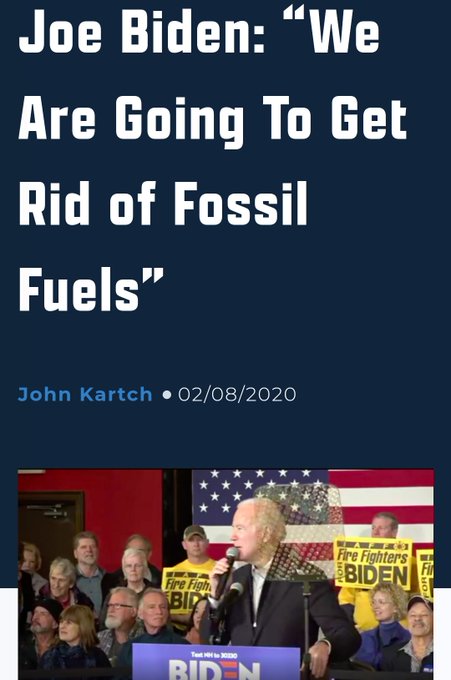Here's what Harold Hamm has to say about that. You know who he is, but for anyone who doesn't, he pioneered development of the Bakken Formation in North Dakota, and is one of America's most successful oilmen.
Biden’s War on Oil Hits Consumers
The American energy industry is ready to help if Washington stops trying to put us out of business.
Gasoline prices are higher than we have ever seen. The government reported a year-over-year inflation rate of 7.9% for February, the highest since 1982. Americans need relief, and one thing stands in the way: President Biden’s unwillingness to reverse course on his administration’s commitment to put the American oil-and-gas industry out of business at the consumer’s expense.
In the year since the administration froze new drilling leases on 26% of federal land and more than a third of the nation’s resources in productivity, the U.S. has been falling further from energy independence, putting national security at risk. There is no good reason for America to become more reliant on energy imports. It constrains our policy choices, forces us to cede our national security to foreign players and enriches those who would do us harm. This administration is working with the Saudis, Venezuela and even Iran to come to the rescue. Why?
The U.S. needs domestically produced oil and natural gas. In 2019 the U.S. became energy-independent, a net exporter. Gas and electricity prices were low, and the U.S. was the largest producer of energy on the planet. Thanks to abundant and affordable clean-burning natural gas, brought to us by horizontal drilling, the reduction in greenhouse-gas emissions was the most successful in the industrialized world.
Modern life is predicated on cheap, abundant and reliable energy. This administration has manufactured scarcity and mandated insecurity around the globe. Energy prices are rising everywhere, and releasing a couple of days’ supply from our strategic reserves is a temporary patch. The largest strategic reserve in the world is under our feet.
The solution lies in three simple actions: First, make it official U.S. policy to restore energy-independence by using all sources of available energy. Announce the intent to bring on more supply of oil and gas in the U.S. This provides certainty for producers to bring new capital and supplies to the market, meeting current world demand.
Second, open federal lands for energy development. The 9,000 permits the White House keeps touting is misleading at best. Thousands of those sites can’t be developed as they are held up in litigation. Others require new permits and leases to make a full unit. Thousands more await approval. Conservatively, our data tells us the number of available permits ready for production today stands closer to 1,500, and many of those are already drilling. No leases have been issued for federal land since 2020.
Third, support energy infrastructure, including pipelines to transport natural gas, oil and CO2 safely. Projects such as the Mountain Valley Pipeline would increase energy availability and enhance our ability to export to our allies.
Last week we heard for the first time that Energy Secretary Jennifer Granholm is ready to work with “everyone and anyone who is willing to take a lead into the future by diversifying your energy portfolios to add clean fuels and technologies.” The American oil-and-gas industry has done just that. My message to the administration is this: The people of American oil and gas stand ready to work with you on U.S. energy development.
https://www.wsj.com/articles/bidens-...ts_pos2&page=1
Originally Posted by Tiny
I'm sure HH is not biased....I see your link and raise you a link.
https://oilprice.com/Energy/Energy-G...dependent.html
Last December I covered the nuances of U.S. energy independence. A common belief that I encounter is that President Trump made us energy independent, but we lost that energy independence under President Biden.
That’s not strictly true, but it requires a bit of understanding about what energy independence actually is. I covered these issues in Is The U.S. Energy Independent?
If you are confused about the definition of energy independence, also see What Is Energy Independence?
As I explained, a correct accounting would be to add up all of our energy production (oil, natural gas, coal, renewables) and then subtract our net energy consumption. The U.S. is a net exporter of coal and natural gas, so it really comes down to the petroleum balance.
U.S. net imports have been declining since 2005 as a result of hydraulic fracturing. That year, U.S. net imports of petroleum and petroleum products (e.g., gasoline, diesel, jet fuel) averaged 12.5 million barrels per day (BPD). By the time President Obama left office, the number had declined to 4.8 million BPD (Source). During Obama’s last full month in office, the number was 4.2 million BPD.
When President Trump took over, the downward trend continued. During President Trump’s last year in office, the net import number turned negative. It is therefore true that we gained energy independence (per this definition of net imports) under President Trump. Net exports in 2020 averaged 635,000 BPD for the year.


 Originally Posted by WTF
Originally Posted by WTF
